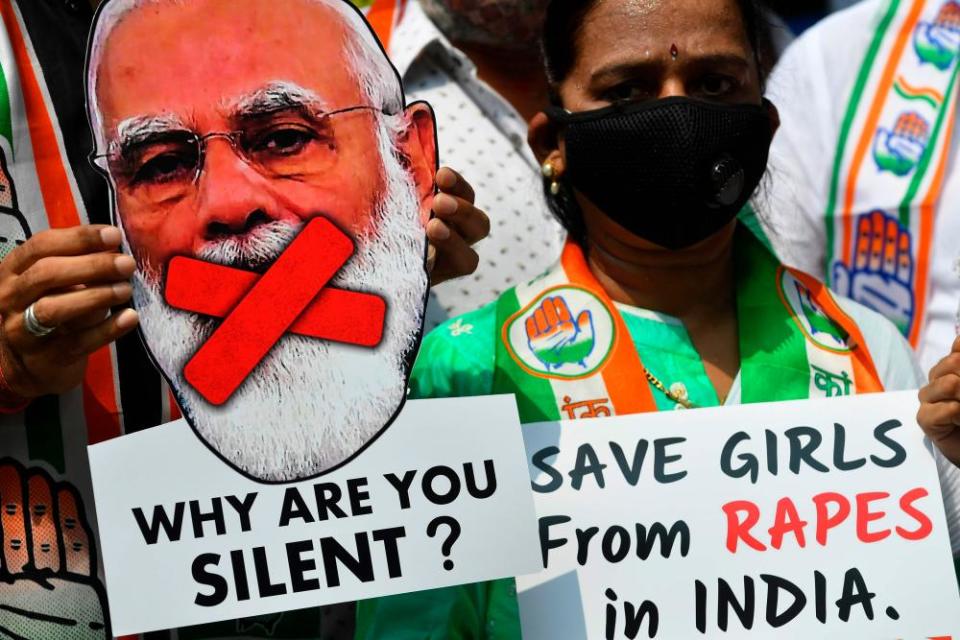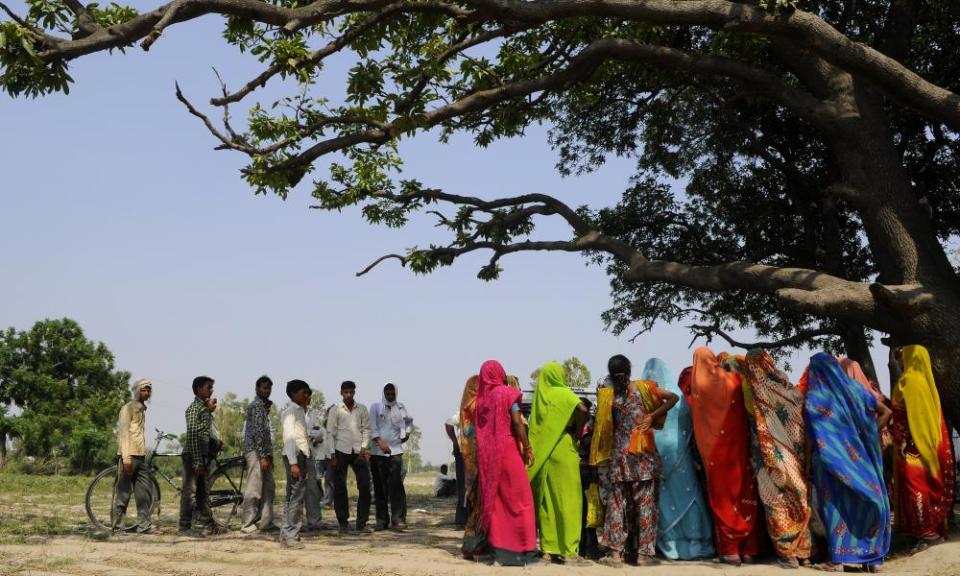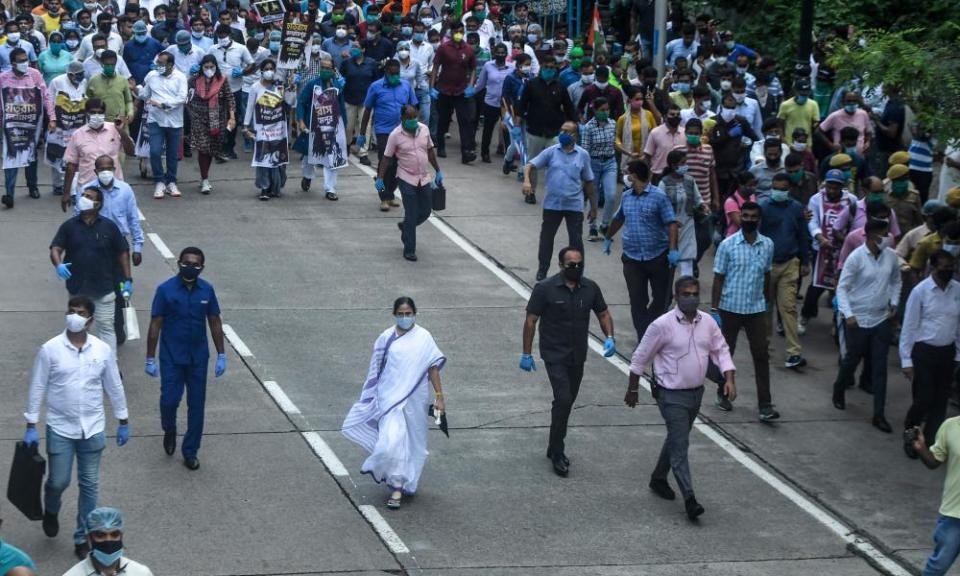Student’s rape and murder puts India’s sexual violence under spotlight again

It was a historic day for women in India. Mamata Banerjee and her party won a spectacular election victory in West Bengal, defeating the Hindu nationalist Bharatiya Janata party (BJP) of the prime minister, Narendra Modi, defying many predictions. Securing a third term as chief minister, she was the only woman in such an important position in India.
The following day, 3 May, while TV anchors debated how Banerjee’s win represented not only a strong force against Modi but also made her a powerful woman in a patriarchal country, a 20-year-old student, known only as Jana (her identity cannot be revealed under Indian law), was cornered by two men in a village, about 70 miles west of Kolkata, West Bengal’s main city.
The builders were working in the abandoned mud-brick house of her family, adjacent to their double-storey home.
“The girl was cornered by the two men,” said police. “When she protested, one covered her mouth and the other dragged her and then they raped her inside the mud house.”
This happened, the police investigation revealed, in front of a female co-worker who was silent as the men choked Jana to death.
The case underlined once again the reality that India is one of the most dangerous places to be a woman. A rape is reported in the country every 15 minutes, according to last year’s Ministry of Home Affairs’ annual crime report. Most perpetrators are known to the victim, like the alleged attackers in this case, who had been working in the house for months and were known to her family.
Because of widespread post-election violence in the state, the murder was barely reported in Indian national media.
Students from the college where Jana was studying took to the streets the day after her body was discovered. Carrying banners and placards, they demanded justice – including calls to hang the rapists. The students continued their protests for several days before the state was, like other parts of India, put under lockdown due to the sharp increase in Covid cases.

Sanka Chatterjee was the first police officer on the scene. “She had blood all over,” he said. “I haven’t felt so helpless and angry in my 11 years of service as I did after looking at her dead body.”
Chatterjee said that all the police at the crime scene were in tears. “It was unbearable to see how she was subjected to such a beastly act,” he said.
In 2012, after the brutal gang-rape and murder of a student on a bus in Delhi, India’s sexual violence rates were brought to the attention of the world. Thousands came out on the streets demanding justice for the victim, who came to be known in the media as Nirbhaya, meaning fearless. Because of the public pressure, new legislation doubled prison terms for rapists to 20 years, and four perpetrators were hanged in March 2020.
However, little seems to have changed. Government figures for 2020 show 244,000 cases of rape and sexual violence against children were pending in the courts.
Police said they had arrested three suspects in Jana’s case but they have yet to file formal charges in court.
The delay has left the family dejected and angry. “We are ready to fight for justice,” said Jana’s 25-year-old elder sister. “But there is still a sense among my family that real justice will never be served.”
Days after the murder the family wrote to the state’s chief minister, hoping Banerjee would ensure swift action, but they have had no response.
Jana’s fellow students remember a brave soul who would always speak up against injustice. “Whenever there were any kind of issues, at the college level or anything bigger, she would raise her voice,” said a classmate, SK Sahil, who is one of the students demanding justice for Jana on social media.
To her family, she was a lively girl who loved music and had a passion to travel. “She had recently joined a singing course and was pursuing it rigorously,” said her sister, adding that she would often talk about the places she wanted to visit and how she would save her money to travel.
Her father, who is a farmer, and mother, a community health worker, have been devastated by the crime.
“Their mental health has been affected badly, not only because such a terrible thing happened with her but because it happened in our own home, so close to them,” said Jana’s sister.
Related: Rape victims in south Asia still face vaginal tests, report finds
Since the incident the village, which is surrounded by green paddy fields, has been eerily silent with villagers fearing to venture out, even during the day.
“I don’t let my wife and girls go out alone,” said a villager, who did not want to be named.
Chatterjee said he had never been involved in such a painful case. “We are connecting each dot in our investigation and collecting all the evidence so that the case is watertight in the court and they get the highest possible punishment,” he said.
But the courts stand accused of approaching rape cases with patriarchal and regressive attitudes. Earlier this year a former chief justice of India’s supreme court asked a man accused of raping a child whether he would marry the victim in order to settle the case. The incident caused outrage in India.

Vrinda Grover, a lawyer and activist, said the legal reforms were introduced in 2013 as a response to the public outcry for justice, but sexual violence continued because “the state and society are unwilling to invest resources which would change the underlying inequality, discrimination and prejudice against women”.
However, Grover said she was optimistic about the future because “women are no longer willing to suffer in silence”.
“They are challenging and speaking out against all forms of sexual violence, often relying on the new law, that sets a normative standard foregrounding bodily integrity and sexual autonomy as dimensions of a woman’s dignity and privacy,” she said.
“Women’s insistence and assertion as they lay claim on freedom as equal citizens, as they seek justice in courts and on the streets, will compel state and society to transform.”
In the UK, Rape Crisis offers support for rape and sexual abuse on 0808 802 9999 in England and Wales, 0808 801 0302 in Scotland, or 0800 0246 991 in Northern Ireland. In the US, Rainn offers support on 800-656-4673. In Australia, support is available at 1800Respect (1800 737 732). Other international helplines can be found at ibiblio.org/rcip/internl.html

 Yahoo Finance
Yahoo Finance 